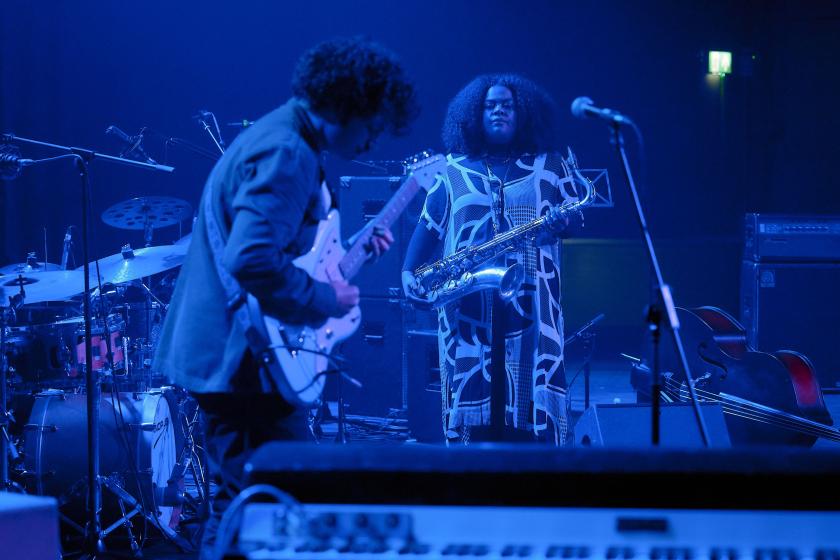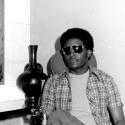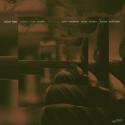Quite how Shabaka Hutchings manages to be Shabaka Hutchings is one of the great mysteries of modern culture, and one that could probably teach us all a lot of value to society if we ever worked it out. From the devastating energy of The Comet Is Coming and Sons Of Kemet to the gentlest of shakuhachi experiments posted near daily on his social media, he consistently pushes the boundaries of style and genre. He’s played with everyone from Courtney Pine to the Sun Ra Arkestra, Mulatu Astatke to the Ligeti String Quartet, and he’s still only in his thirties. And on top of that, he is a mentor to a generation of artists, not least through his Native Rebel label.
At the showcase for Native Rebel as part of the EFG London Jazz Festival, he was a constant sprightly presence, not just on stage, but darting about among the crowd, taking pictures, greeting people, and grinning a lot. It was a buzzy crowd anyway, pretty much filling the large upstairs theatre of EartH in Dalston, but he was visibly adding to that buzz from the beginning. And that went double when MC Kevin Le Gendre introduced Hutchings on stage as conductor for his new project Kofi Flexxx.
This band is apparently inspired by Hutchings’s experience of the exuberance of school bands in the Caribbean, and featured an array of young wind players with a couple of more experienced musicians underpinning them. They were held together by a powerhouse rhythm section of Jas Keyser and Daisy George on drumkit and bass, and the massed sound and mix of abilities – including delirious flute from the hilariously exuberant Biscuit – all added to a brilliant sense of communality. This was jazz as inclusive party and set the tone brilliantly for the night.
Things went much deeper with Mancunian saxophonist Chelsea Carmichael, though. Her stunning 2021 debut album for Native Rebel, The River Doesn't Like Strangers, was recorded with Dave Okumu and Tom Herbert of The Invisible, and had strong psychedelic rock, spaghetti western and even sublimated cabaret elements as well as a hefty dub reggae chassis. Her live band – Nikos Ziarkas on guitar, Mutale Chashi on stand up bass and Oli Sarkar on drums – not only captured the unique mood of that record but lifted it up and took it to new places.
In particular, Ziarkas proved an absolute master of extreme guitar processing. With a fairly limited array of pedals he elevated those psychedelic elements, sending little swirls of pitch-shifted runs echoing into the air, and creating Cocteau Twins-like otherworldly chords that hovered like perfumed mist. But this was never distracting from the rhythm section and Carmichael’s own playing which constantly kept things grounded and rugged; Carmichael’s tone in particular was consistently pure and powerful, her notes almost like something you could grasp.
It was a transporting set. The only moment the magic let up was when Chashi soloed, and the tone of his playing was swallowed by the acoustics of the cavernous space. This was a problem which became more serious for the next set: CoN and KwAkE (better known individually as Confucius MC and Kwake Bass). Kwake is a vastly talented producer, musical director, and in this case drummer – triggering digital basslines and samples as he went, providing back up for Confucius’s conscious rap, with bonus lavish keyboards from Alex Hawkings.
The problem was, that cavernous space – which for the most part had not been a problem for the first two acts, because the groove was paramount – left Confucius’s lyrics unintelligible. The performance was clearly extraordinary, with the interlocking of word, playing and digital embellishment inhumanly tight, and character radiating from the performers. But where a bit of muffling of an instrumental part was one thing, the missing lyrics were deeply frustrating.
Sadly transport problems meant I had to leave shortly into the final set South Africa’s The Brother Moves On, but they were already kicking up a steady groove with Siyabonga Mthembu’s vocals hitting an emotional spot. Perhaps the language barrier – he sings in Zulu – made it easier to ignore the blurring of syllables by the acoustics where it had been harder to forgive that on the previous precision-rapped lyrics. Regardless, I left on a high, with an overwhelming sense of how Native Rebel is making jazz not just accessible, not just fresh for the 2020s but viscerally enjoyable and inspirational to boot. In particular, the intense magic of Chelsea Carmichael’s set lingered – still lingers – in sense memories, as a brilliant rewiring of just what a band can be.















Add comment